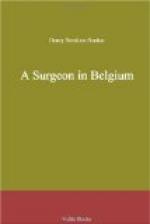We went on to Sempst, a small village at the extreme limit of the Belgian lines. A little stream ran under the road beside a farm, and a rough breastwork had been thrown across the road to defend the bridge. German soldiers could be seen a mile down the road moving behind the trees. It was only a small Belgian outpost, but it was a good enough position to hold, so long as the enemy did not bring up artillery. A machine gun was hidden beside the bridge, and would have made short work of anyone advancing up the road. My friends were talking to the men, whom we knew quite well; and for a moment I was standing alone, when one of the soldiers came up and asked about the man whom we had just left, and who had come from near by. I told him what had happened, and for a moment he did not speak. At last he looked up at me with tears in his eyes, and said simply: “He was my brother, and this morning we were laughing together.” I held his hand for a moment, and then he turned away and went back to his post.
Our way home led past a villa where an encounter had taken place three days before between the Belgians and an advanced detachment of German troops, and we stopped to see the scene of the fighting. It was a large country-house standing back in its own grounds, and during the night a party of Germans had succeeded in concealing themselves inside. In the morning, by a ruse, they induced a Belgian detachment to come up the drive towards the house, never suspecting that it was not empty. Suddenly the Germans opened fire, and I believe that scarcely a single Belgian escaped. Next day, however, having surrounded the villa, the Belgians opened fire upon it with their 3-inch guns. The Germans made a bolt for it, and the whole of them were killed. As we walked up the drive we saw on the left-hand side a little row of graves with fresh flowers laid on them. They were the graves of the Belgian soldiers who had been entrapped. An officer was standing by them with bared head, and, seeing us, he came over and walked on with us to the house, which he was then occupying with his soldiers. It was a fine house, with polished parquet floors and wide staircases. The dining-room was ornamented with delicate frescoes in gilt frames. In the drawing-room stood a new grand pianoforte, and light gilt chairs and sofas, looking strangely out of place on the field of war. By the front-door, sticking in the wall, was a shell which had failed to burst. I wonder if it is still there, or if anyone has ventured to shift it. It was half inside and half outside, and if it had exploded there would not have been much of the entrance of the house left. Upstairs the rooms were in glorious confusion. Apparently the Germans had opened all the drawers, and flung their contents on the floor, with the idea, I suppose, of taking anything they wanted. One room was plainly the nursery, for the floor was covered with children’s toys of all descriptions, all broken. It may be very unreasonable, but that room made me more angry than all the rest of the house. There is something so utterly wanton in trampling on a child’s toys. They may be of no value, but I have a small opinion of a man who does not treat them with respect. They are the symbols of an innocence that once was ours, the tokens of a contact with the unseen world for which we in our blindness grope longingly in vain.




